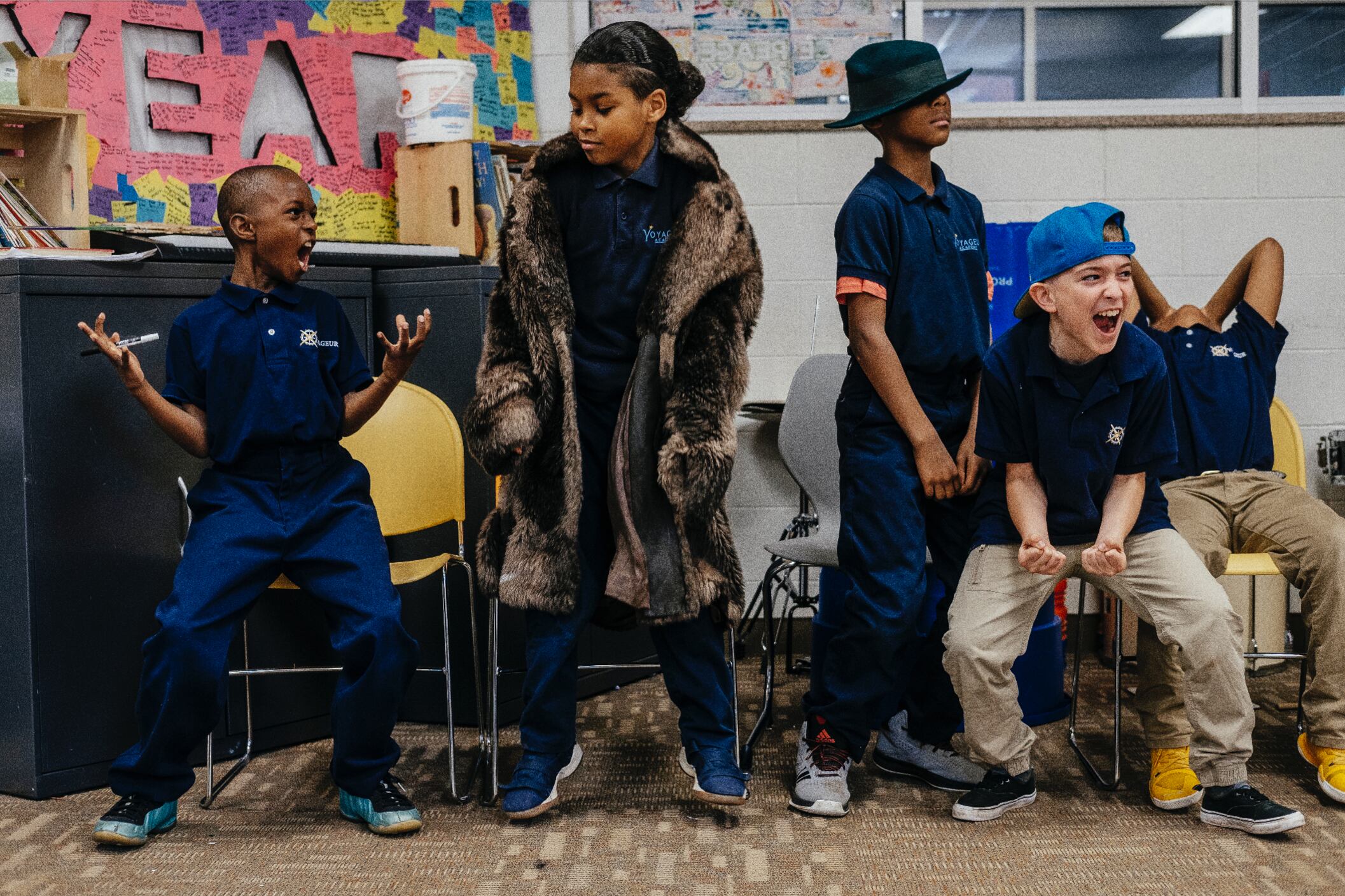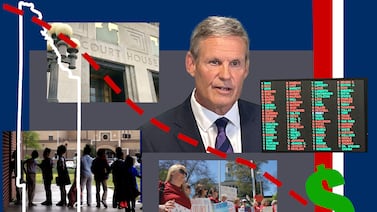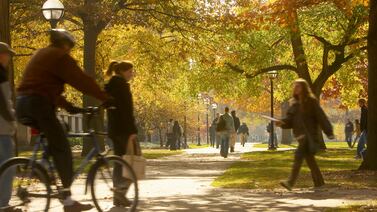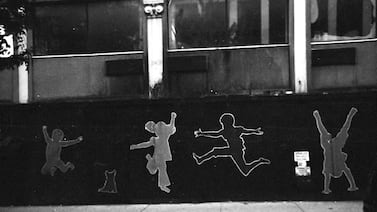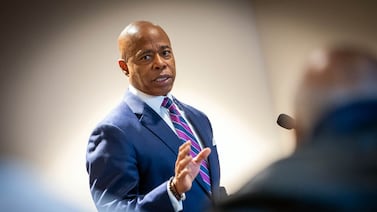You hear Joe Vercellino’s music classroom before you see it.
Vercellino, a Michigan Regional Teacher of the Year 2021-2022, wants his students at Voyageur Academy in Detroit to feel that “they have worth, they have value, that they have a beautiful future, and that they are part of something big.”
The big noise in his room is the sound of collaborative artmaking. His classes have published dozens of songs and music videos — including Zoom-based productions during the pandemic — that feature the students rapping, singing and dancing. Vercellino handles production and recording and adds his own musical talents.
“It’s really important that my classroom has an output that is affecting the world and reaching people,” said Vercellino, who grew up in Midland, Michigan, playing the trombone and is entering his 10th year teaching in Detroit. “When you think of a songwriter, you think maybe of a person sitting with a notepad or something, but what’s beautiful about my classroom is you see a song being created with 25 people-plus taking part in the process.”
We spoke with Vercellino about what goes into making music, how he plays to students’ strengths, and what it means to support students of color as a white educator.
This interview has been lightly edited for length and clarity.
What led you to a career in education?
For me, it was pretty simple. It was like addition. I knew two things about myself. I knew that all of my most enriching opportunities for growth, my greatest moments of delight, all of those were surrounded by my experiences with music.
The second thing I knew was that I’ve always loved being part of the development and growth of young people. Ever since I was in high school, I was part of mentoring programs. And I was the oldest of seven kids, so I’ve always had that big brother quality.
So in college, I thought, “Now that I know these two things, it makes sense to be a music teacher.”
On my resume, I put down that I was a street musician because I had spent my summers traveling around Michigan, New York, Boston, Florida, Chicago — playing on street corners.
That’s what led to my first job in Detroit because the recruiters saw that I was a street musician, and they said, “Well, we don’t have money for a music program, we don’t have instruments, can you help us create something beautiful from nothing?”
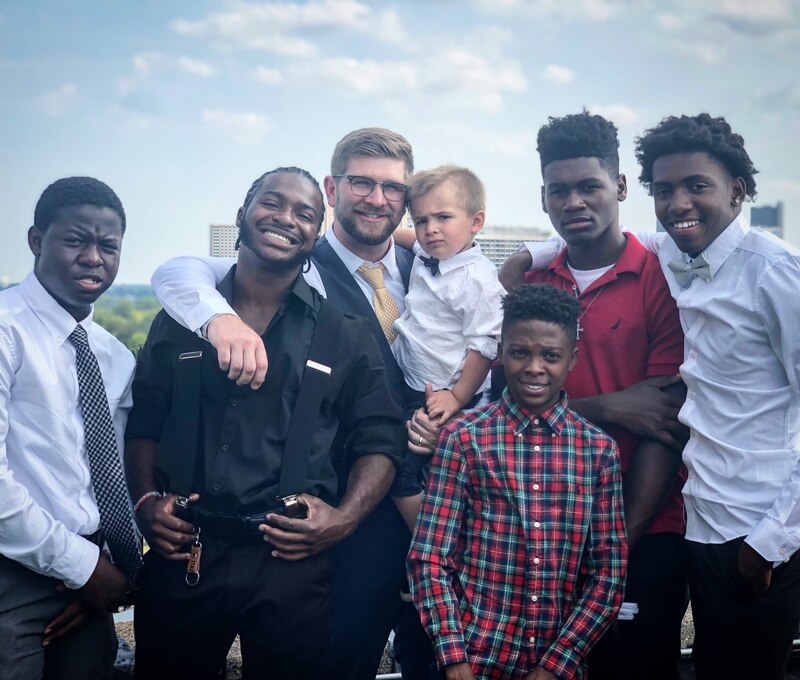
How do you create something from nothing as a music teacher?
We take a group of 25 students and say, “We’re going to write a song together.”
There’s a lot of pieces, a lot of roles, a lot of ways for students to be able to participate in that. There’s coming up with the title, there’s coming up with the content, there’s writing the chorus and the verses, there’s being part of the singing, there’s being part of the music that happens in the background, there’s depicting the song visually through artwork.
Seeing a song go from a melody that you hum to something that your whole school can participate in is a huge deal for my students. I love seeing them go through that process of discovery.
Students share the videos on Instagram. They’re like, “Hey, check out this song; we’re on Apple Music!”
I love that students are excited to share what they have developed.
What do you want people to know about your students?
They’re bright, talented, and full of potential. My students deserve great teachers and exceptional opportunities in the world.
What’s one thing you’ve read that’s made you a better educator?
“Where Do We Go from Here: Chaos or Community?” by Martin Luther King, Jr. It helped me understand my students from a historical perspective, a religious perspective, an emotional perspective, a political perspective.
It’s the last thing MLK wrote before he was murdered, and it provides insight into the Black experience in our country. And I need that; I need to have that.
After I read it, I thought, “This is going to be a pillar of who I am as an educator.” I can’t come into an entirely Black and Brown context as a white educator and just say that my love and care for my students is enough. It’s not enough. Students want to be understood. You have to put in the work as an educator to find that understanding.
Have you seen School of Rock, the 2003 comedy in which a substitute teacher played by Jack Black secretly forms a band with his students?
I remember the night I watched it. I was a freshman in high school. Even as a kid watching that movie, I was like, “that can’t be too far-fetched.” I remember thinking to myself that those kids felt like they’re part of something big. I haven’t wanted to be Jack Black, but the essence of that movie definitely has an influence in my classroom.


